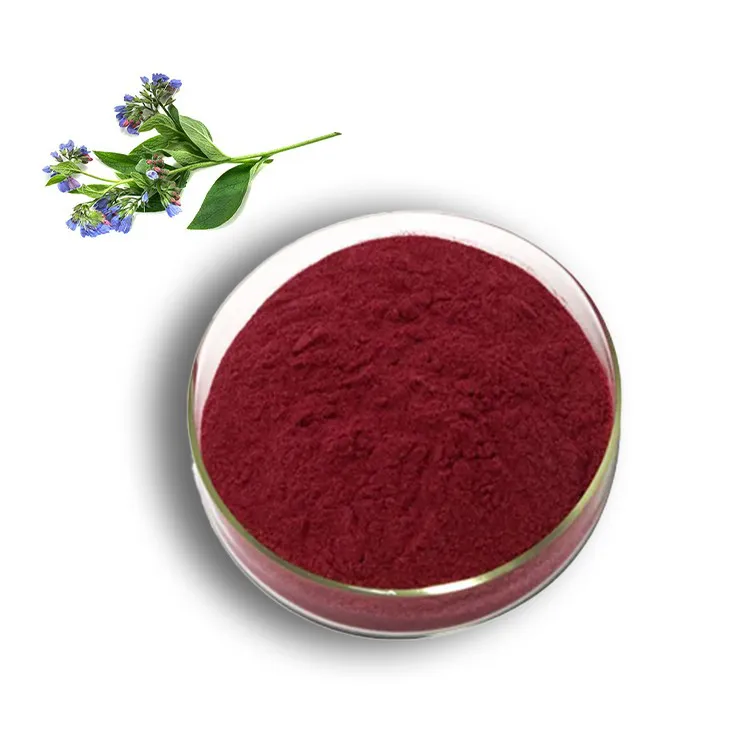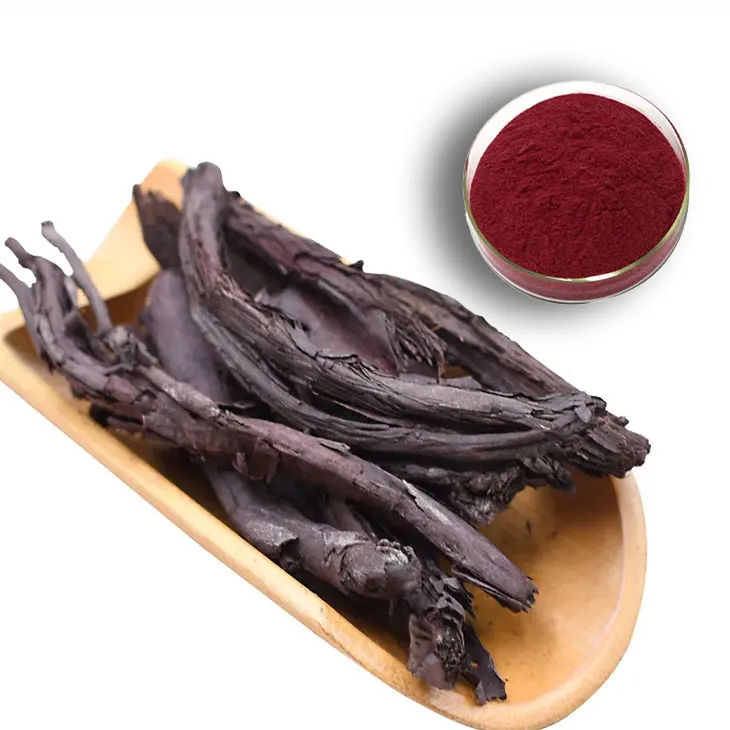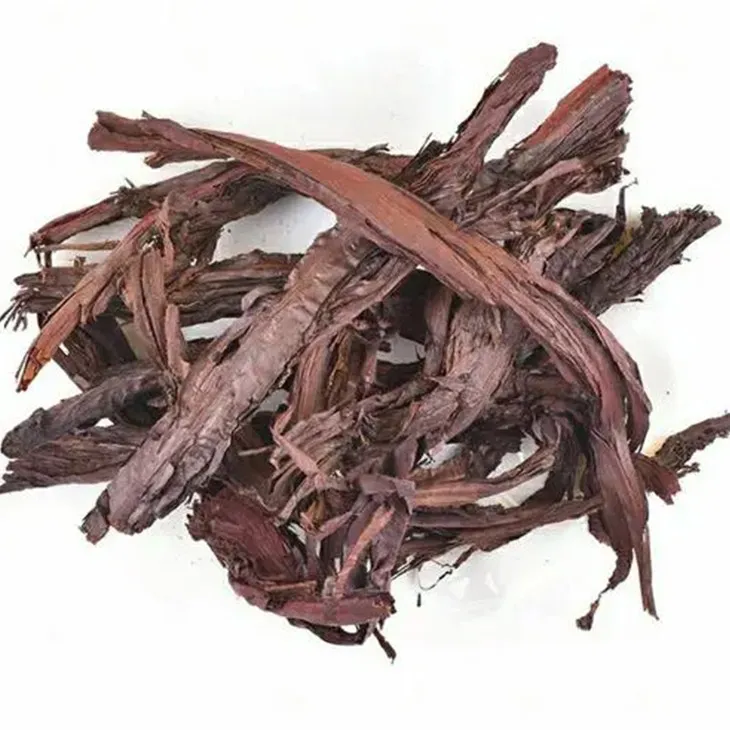- 0086-571-85302990
- sales@greenskybio.com
Understand the Benefits of Shikonin Supplements.
2024-11-13

1. Introduction to Shikonin
Shikonin is a natural compound that has been the focus of much scientific research in recent years. It is derived from the roots of the plant Lithospermum erythrorhizon, which has a long history of use in traditional medicine in some Asian countries. Shikonin has a unique chemical structure that gives it a variety of biological activities, making it a potentially valuable supplement for human health.

2. Anti - Inflammatory Effects
2.1 Inflammation and Health Inflammation is a natural response of the body's immune system to injury or infection. However, chronic inflammation can be a major contributor to many diseases, such as arthritis, heart disease, and diabetes. Therefore, finding natural substances with anti - inflammatory properties is of great importance in the field of health.
2.2 How Shikonin Works Against Inflammation Shikonin has shown potential in reducing inflammation through multiple mechanisms. It can interfere with the production of inflammatory mediators, such as cytokines and prostaglandins. These molecules play key roles in the inflammatory process, and by modulating their production, shikonin can help to alleviate the symptoms of inflammatory - related conditions. For example, in studies on arthritis models, shikonin has been shown to reduce joint swelling and pain, which are typical symptoms of arthritis.
2.3 Potential Applications in Inflammatory Diseases - Arthritis: As mentioned above, shikonin may offer relief for arthritis patients. It could potentially be developed into a new treatment option, either alone or in combination with existing drugs. - Inflammatory Bowel Disease (IBD): IBD, including Crohn's disease and ulcerative colitis, is characterized by chronic inflammation in the gastrointestinal tract. Shikonin's anti - inflammatory properties may help to reduce the inflammation in the gut, improving the symptoms and quality of life for patients with IBD. - Skin Inflammation: Skin conditions such as eczema and psoriasis are often associated with inflammation. Shikonin may be beneficial in treating these conditions, as it can penetrate the skin and exert its anti - inflammatory effects locally.

3. Antioxidant Properties
3.1 The Danger of Free Radicals Free radicals are highly reactive molecules that are produced during normal cellular metabolism as well as in response to environmental factors such as pollution, radiation, and smoking. These free radicals can cause damage to cells by oxidizing important biomolecules, such as DNA, proteins, and lipids. This oxidative damage is associated with aging and many diseases, including cancer, neurodegenerative diseases, and cardiovascular diseases.
3.2 Shikonin as an Antioxidant Shikonin has strong antioxidant properties. It can scavenge free radicals, thereby protecting cells from oxidative damage. In vitro studies have shown that shikonin can effectively neutralize various types of free radicals, such as superoxide anions and hydroxyl radicals. This antioxidant activity of shikonin may contribute to its potential health benefits in preventing and treating diseases related to oxidative stress.
3.3 Implications for Health and Disease Prevention - Anti - Aging: By reducing oxidative damage, shikonin may help to slow down the aging process. It can protect skin cells from damage, reducing the appearance of wrinkles and improving skin elasticity. In addition, it may also protect internal organs from age - related degeneration. - Cancer Prevention: Oxidative stress is known to play a role in the development of cancer. Shikonin's antioxidant properties may help to prevent DNA damage and mutations that can lead to cancer. Although more research is needed in this area, shikonin shows promise as a potential chemopreventive agent. - Neuroprotection: In neurodegenerative diseases such as Alzheimer's and Parkinson's, oxidative stress is a major contributing factor. Shikonin may protect neurons from oxidative damage, potentially slowing down the progression of these diseases.

4. Anti - Cancer Activities
4.1 Cancer: A Global Health Problem Cancer is one of the leading causes of death worldwide. Despite significant progress in cancer treatment in recent years, there is still a great need for new and more effective therapies. Natural compounds with anti - cancer properties, such as shikonin, are being actively explored as potential alternatives or complementary treatments.
4.2 Mechanisms of Shikonin's Anti - Cancer Action - Cell Cycle Arrest: Shikonin can interfere with the cell cycle, preventing cancer cells from dividing and proliferating. It can target specific checkpoints in the cell cycle, such as the G2/M checkpoint, and halt the cell cycle progression of cancer cells. - Apoptosis Induction: Another important mechanism of shikonin's anti - cancer activity is the induction of apoptosis, or programmed cell death, in cancer cells. Shikonin can activate various apoptotic pathways within cancer cells, leading to their self - destruction. - Inhibition of Tumor Angiogenesis: Tumor angiogenesis, the formation of new blood vessels to supply nutrients and oxygen to tumors, is crucial for tumor growth and metastasis. Shikonin has been shown to inhibit tumor angiogenesis by suppressing the activity of angiogenesis - related factors, such as vascular endothelial growth factor (VEGF).
4.3 Current Research and Future Prospects Current research on shikonin's anti - cancer activities is still in the pre - clinical and early clinical stages. However, the results so far are encouraging. In vitro and in vivo studies have demonstrated its potential efficacy against various types of cancer, including breast cancer, lung cancer, and leukemia. Future research should focus on further elucidating the mechanisms of action, improving the delivery of shikonin to tumors, and conducting more extensive clinical trials to evaluate its safety and effectiveness as a cancer treatment.
5. Other Potential Benefits
5.1 Wound Healing Shikonin has been shown to have properties that can promote wound healing. It can stimulate the migration and proliferation of fibroblasts, which are important cells in the wound - healing process. Additionally, its anti - inflammatory and antioxidant properties can also contribute to creating a favorable environment for wound healing, reducing inflammation and preventing oxidative damage to the newly formed tissue.
5.2 Antimicrobial Activity Some studies have suggested that shikonin may have antimicrobial properties. It can inhibit the growth of certain bacteria, fungi, and viruses. This antimicrobial activity may be related to its ability to disrupt the cell membranes of microorganisms or interfere with their metabolic processes. Although more research is needed to fully understand its antimicrobial potential, shikonin could potentially be used in the development of new antimicrobial agents.
6. Considerations for Shikonin Supplementation
6.1 Safety and Toxicity While shikonin shows many potential health benefits, it is important to consider its safety and toxicity. In general, shikonin has been relatively well - tolerated in pre - clinical studies at appropriate doses. However, high doses may cause some adverse effects, such as liver and kidney toxicity. Therefore, more research is needed to determine the optimal dose range for human supplementation.
6.2 Quality Control When considering shikonin supplements, it is crucial to ensure the quality of the product. The purity of shikonin in supplements can vary widely, and contaminants may be present. Consumers should choose products from reliable sources that adhere to strict quality control standards.
6.3 Interaction with Medications Shikonin may interact with certain medications. For example, it may enhance the effects of anticoagulant drugs, increasing the risk of bleeding. Therefore, individuals taking medications should consult their healthcare providers before starting shikonin supplementation.
7. Conclusion
Shikonin is a natural compound with a wide range of potential health benefits, including anti - inflammatory, antioxidant, anti - cancer, wound - healing, and antimicrobial activities. However, more research is needed to fully understand its mechanisms of action, optimize its use, and ensure its safety for human supplementation. As the scientific community continues to explore the potential of shikonin, it may one day become an important component in the prevention and treatment of various diseases.
FAQ:
What is shikonin?
Shikonin is a natural compound that has been found to possess various beneficial properties for health.
How does shikonin show anti - inflammatory effects?
The exact mechanisms through which shikonin exhibits anti - inflammatory effects are still being studied. However, it is believed to interfere with certain pathways in the body that are involved in the inflammatory response, thereby reducing inflammation associated with different conditions.
What are the antioxidant properties of shikonin?
Shikonin has antioxidant properties which mean it can neutralize free radicals. Free radicals are unstable molecules that can cause damage to cells, proteins, and DNA. By combating free radicals, shikonin helps protect cells from this damage and may contribute to overall health and the prevention of certain diseases.
Is shikonin a proven anti - cancer supplement?
While shikonin is being studied for its potential anti - cancer activities, it is not yet a proven anti - cancer supplement. Research has shown some promising results in vitro and in some animal models, but more studies, including clinical trials in humans, are needed to determine its effectiveness and safety as an anti - cancer agent.
Are there any side effects of taking shikonin supplements?
As of now, the potential side effects of shikonin supplements are not fully known. Since it is a natural compound, it may seem relatively safe, but individual reactions can vary. Some people may experience allergic reactions or other adverse effects. More research is required to comprehensively understand the safety profile of shikonin supplements.
Related literature
- The Anti - Inflammatory and Antioxidant Properties of Shikonin: A Review"
- "Shikonin and Cancer: Current Research and Future Perspectives"
- "Shikonin: A Promising Natural Compound for Health - An Overview of its Properties"
- ▶ Hesperidin
- ▶ Citrus Bioflavonoids
- ▶ Plant Extract
- ▶ lycopene
- ▶ Diosmin
- ▶ Grape seed extract
- ▶ Sea buckthorn Juice Powder
- ▶ Fruit Juice Powder
- ▶ Hops Extract
- ▶ Artichoke Extract
- ▶ Mushroom extract
- ▶ Astaxanthin
- ▶ Green Tea Extract
- ▶ Curcumin
- ▶ Horse Chestnut Extract
- ▶ Other Product
- ▶ Boswellia Serrata Extract
- ▶ Resveratrol
- ▶ Marigold Extract
- ▶ Grape Leaf Extract
- ▶ New Product
- ▶ Aminolevulinic acid
- ▶ Cranberry Extract
- ▶ Red Yeast Rice
- ▶ Red Wine Extract
-
Peppermint Oil
2024-11-13
-
Thunder God Vine Extract
2024-11-13
-
Garcinia Cambogia Extract
2024-11-13
-
Alisma Extract
2024-11-13
-
Elderberry Extract
2024-11-13
-
Coix Seed Extract
2024-11-13
-
Hawthorn powder
2024-11-13
-
Resveratrol extract
2024-11-13
-
Coconut Water Powder
2024-11-13
-
Ivy Extract
2024-11-13





















